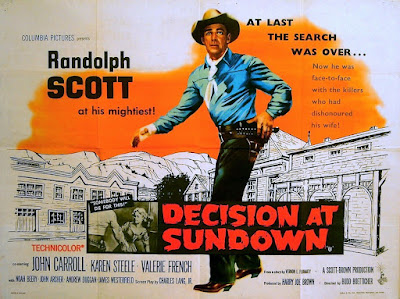“Decision at Sundown” begins with Bart Allison (Randolph Scott) stopping a stagecoach in which he is riding by drawing his gun, seeming as if he’s going to stick it up, only to reveal that he was merely meeting up with his friend Sam (Noah Beery Jr.), galloping up with a second horse in tow. It’s something of an odd opening, drumming up suspense only to instantly deflate it, though it also helpfully sets the tone of reversals. Nothing, not even this, is what it seems. Their destination is the town of Sundance where Bart intends to kill the local boss, Tate Kimbrough (John Carroll). In these scenes, as Bart bullies the barber into keeping his shop open so he can get a shave and exchanging insults with the Sheriff at the saloon, Scott evinces the smug air of a villain, which is why when Bart learns it happens to be Tate’s wedding day, he hardly bats an eye. Gradually, though, as Bart’s motivation becomes clear, that Kimbrough seduced his wife and drove her to suicide, sympathy shifts. It does not render Bart courageous, necessarily, but at least understandable. And though “Decision at Sundown” is set up as Bart seeking to fulfill his gunslinger quest, once he riles things up by invading the marriage ceremony and making plain his threat to Kimbrough, Boetticher expands his movie into something else.
Though Bart and Sam find themselves holed up in a livery stable, Boetticher foregoes accentuating the claustrophobia and moves the story outside to take in the whole town. We watch as Kimbrough, Carroll essentially playing Harvey Korman as Hedley Lamarr with a straight(er) face, demonstrates his hold over Sundown even as the town drunk, giving liquid courage a whole new meaning, emblemizes how the town gradually begins turning on its boss instead. Kimbrough’s fiancé (Karen Steele) eventually breaks off their engagement, though this feels perfunctory, as does her character. That is not, however, to say that Boetticher entirely shortchanges his female characters. Kimbrough’s girlfriend Ruby (Valerie French), on the verge of graduating to mistress, might repeatedly be stranded on the edge of frames in the movie’s multitude of group shots, but that only epitomizes her lack of agency. She grasps this lack too, finally taking action near the end.
Just as we, the audience, are conditioned to expect a final shootout in the middle of the street between Bart and Kimbrough, so too are Bart and Kimbrough conditioned to expect that shootout. In fact, in the scene just before Kimbrough goes out to meet his adversary, a little unexpected humanity is admitted into the character as he confesses to being scared, to not wanting to go through with it but knowing decorum, in a matter of speaking, demands it. This moment foreshadows the biggest and least likely reversal, in which the shootout never comes to pass, both the bullet Ruby plugs in Kimbrough’s shoulder and Sundown’s demand that Kimbrough leave town and never come back preventing Bart from seeing through his bloodthirstiness. In effect, he is denied the ending he expects, just as we are, which rather than heralding a moment of clarity only enhances his rage, leaving him the kind of static character not typically associated with such a protagonist. And though the script might overdo imparting this point with words, Scott is magnificent nonetheless, as if his long-burning, now remediless, rage is eating him from the inside-out.





No comments:
Post a Comment